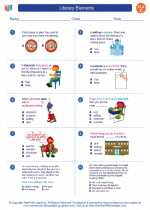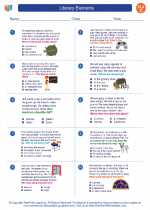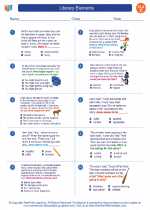Helping Verbs
In English grammar, helping verbs (also known as auxiliary verbs) are used in combination with main verbs to express shades of time and mood. They "help" the main verb by adding information about tense, voice, modality, and emphasis. Some common helping verbs include: be, have, do, can, could, may, might, must, shall, should, will, and would.
Study Guide
- Definition: What are helping verbs and how do they function in a sentence?
- Types: Identify the different types of helping verbs and provide examples for each.
- Usage: Explain when and how helping verbs are used in sentences.
- Conjugation: Study the conjugation of helping verbs in different tenses and moods.
- Practice: Complete exercises and sentences using helping verbs to reinforce understanding.
Understanding helping verbs is essential for building grammatically correct sentences and expressing precise meanings. With practice and application, students can master the usage of helping verbs in their writing and communication.
[Helping Verbs] Related Worksheets and Study Guides:
.◂English Language Arts Worksheets and Study Guides Third Grade. Literary Elements
Worksheet/Answer key Literary Elements
Literary Elements  Worksheet/Answer key
Worksheet/Answer key Literary Elements
Literary Elements  Worksheet/Answer key
Worksheet/Answer key Literary Elements
Literary Elements 

 Worksheet/Answer key
Worksheet/Answer key
 Worksheet/Answer key
Worksheet/Answer key

The resources above cover the following skills:
Reading Standards for Literature
Key Ideas and Details
Describe characters in a story (e.g., their traits, motivations, or feelings) and explain how their actions contribute to the sequence of events. [RL.3.3]